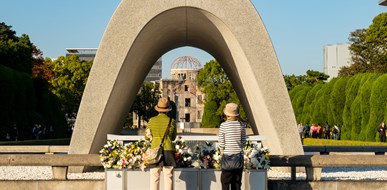Cranes for our future – Disarmament and non-proliferation for a nuclear-free future
Published 27 July 2023
iStock - The Hiroshima Victims Memorial Cenotaph with a view of Atomic Bomb Dome by Aleksandra Tokarz
6 August marks the seventy-eighth anniversary of the first atomic bomb detonated over Hiroshima. Three days later the United States detonated a second bomb over Nagasaki leading a total of between 129,000 and 266,000 deaths, mostly civilians. Today, the Asser Institute joins the Nuclear Threat Initiative and the Hiroshima Organisation for Global Peace (HOPe) in the #CranesForOurFuture campaign and describes a vision for a nuclear-free future.
Activists and civil society are a critical part of arms control. Thilo Marauhn, Special Chair of Arms Control Law at the Asser Institute, has highlighted the importance of civil society in driving the peace movement in his interview in 2022. He refers to the importance of Bertha von Suttner in the late 19th century in laying the ground work for an international order based on law rather than war and the role of civil society in banning landmines through the Ottawa Convention of 1997. The Tenth Review Conference of the Non-Proliferation of Nuclear Weapons Treaty (NPT) provided a crucial moment to build a new consensus last year. However, as Russia refused to accept the final version of the consensus document, there has yet to be an agreement on the path forward to disarmament within the framework of the NPT. The Preparatory Committee for the 2026 Review Conference is set to convene its first session in Vienna this year from July 31 to August 11, 2023.
The importance of civil society to nuclear non-proliferation
“[A]rms control law continues to be relevant, not because we as lawyers can solve the problem of arms control, but because we can provide the instruments that politicians can use to solve these problems.” - Thilo Marauhn
Thea Coventry, co-coordinator of the training programme on Disarmament and non-proliferation of WMD 2023 shared her vision on a future without nuclear weapons:
“A future without nuclear weapons requires many small steps by activists, academics, and governments to change our current reality (deterrence) into a safer one (disarmament). Each single action plays a part in achieving and maintaining that future, as the recent elaboration of the Treaty on the Prohibition of Nuclear Weapons has shown. While codifying legal norms does not prevent nuclear war, it works towards creating a world where the development, possession and use of nuclear weapons is unthinkable.”
The dangers of a new nuclear era
The war in Ukraine, and Vladimir Putin’s frequent reminders of Russia’s nuclear arsenal, have highlighted the dangers of a new nuclear era and the Asser Institute's Arms Control Law Hub aims to play a key part in arms control education with a series of professional trainings as well as academic workshops in 2023.
Chemical and nuclear weapons can have tragic, long-term consequences for civilians and survivors. Homeyra Karimivahed speaks about the effects of the chemical attack on her birthplace Sardasht during the Iraq-Iran war and her experience participating in the Asser Institute training programme on the non-proliferation of weapons of mass destruction organised in partnership with the OPCW.
International law is critical in dealing with nuclear weapons threats
The tragedy in Hiroshima and Nagasaki reminds us of the devastating power of nuclear weapons. International law and the nuclear non-proliferation framework can play an essential role in protecting us from the dangers of these weapons. However, this requires professionals in the field of Weapons of Mass Destruction (WMD) to tackle the challenges of today’s non-proliferation and disarmament agenda with an integrated understanding of these issues. From 19 to 22 September 2023, the Asser Institute in The Hague will host the fourteenth training programme on disarmament and non-proliferation of weapons of mass destruction, co-organized with the Organisation for the Prohibition of Chemical Weapons (OPCW).
